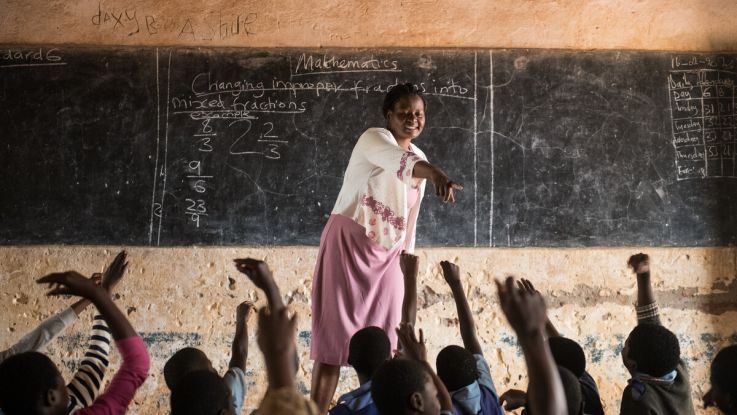Fathers: let’s discuss how to raise our sons
16 June 2023
This Father's Day, actor and ActionAid Ambassador James Purefoy writes about toxic masculinity, misogyny, and how men can take a role in ending violence against women and girls.

Male volunteers in Zimbabwe advocating for an end to violence against women and girls. Photo: ActionAid
Five years ago, I fronted ActionAid’s video campaign for Father’s Day with one key message: let's end violence against women and girls. In the film, I give advice to my “daughter” about protecting herself from harm and about claiming her rights both in football and in life.
But in a year when there have been many conversations about toxic masculinity, I think it’s time we moved the goalposts.
So I’m turning to my sons to talk about ending violence against women and girls.
Let’s start with what lays the foundations for gender-based violence and admit that it’s the patriarchal belief of men’s power over women - their strength and dominance being one of the keys to their ‘masculinity’.
We must address how men view masculinity, misogyny and power
The same views that underpin misogyny also underpin violence against women and girls.
Let’s shift the focus from how women will prepare and protect themselves for violence to how we men can prevent it.
From violence at home, to street harassment, to more structural violence like economic violence and discrimination, men have a responsibility to claim and a role to prevent it and end it. To do so we need to address how men view themselves and their power.
Let’s shift the focus from how women will prepare and protect themselves for violence to how we men can prevent it.
My eldest son is now in his mid-twenties but as he reached his teenage years, social media platforms such as Instagram were growing rapidly.
Now, TikTok, Instagram and Twitter are used as informational, even instructive, tools – I see him typing ‘how to’s?’ into the search bar, (possibly) reading current affairs via his ‘news feed’ and perhaps, most disconcertingly, seeking certain influencers input when forming his own opinions.
Who are his role models? Who is helping him to shape what it means to be a man? We can’t control what they’re seeing online, but we can do our best to bring the important conversations into our homes.
Male allies in Zimbabwe are advocating to end violence
We can draw a fantastic example from a programme run by ActionAid in Zimbabwe, made possible with funds raised by players of People’s Postcode Lottery.
Men volunteer their time to become allies in communities which were taught to believe that men are dominant, and that they can exercise their power over women and girls.
The programme began because there were so many reported instances of violence against women and girls including sexual violence, in homes and communities - especially in the rural areas.
I realised all along I was using my power to destroy my community instead of building it. Now I use my power to end all forms of violence against women and girls."
The volunteers conduct peer-to-peer dialogues and advocate for an end to violence against women and girls.

Men participate in a peer-to-peer-led session on preventing violence against women and girls, run by volunteers in rural Zimbabwe .
Jacob is one such ally taking part in this project, hosting conversations with his peers in places traditionally seen as male spaces - markets, bars and football grounds.
In Jacob's sessions the men discuss their power and how it is used and abused. Jacob said he "realised all along I was using my power to destroy my community instead of building it. Now I use my power to end all forms of violence against women and girls."
While some of these discussions have been challenging, slowly - with incremental steps - communities across Zimbabwe are starting to see a change. An incredible 27,000 men and boys have taken part in the sessions so far.
Delving deeper into root causes of violence against women and girls
In the dialogues, the men discuss the difference between being assertive and being aggressive. They listen to women who are survivors of violence to help them better understand the impact of violence and how it comes in different forms - sexual, physical, economic and psychological.
They discuss reporting violence and supporting survivors and they challenge the attitudes that blame women for the violence perpetrated against them.
But the sessions also delve deeper into the root cause of violence against women and girls - the belief that men have power over women. Participants discuss the advantages men are given over women from birth.
Everyone benefits from a community where men and women are treated as equals.
They dissect stereotypical gender roles and how the burden of caring responsibilities and breadwinning are best shared. They discuss what masculinity and femininity means to them, what it means to be a man and that men can show vulnerability without it diminishing their ‘manliness’.
They share examples of exceptional women leaders to demonstrate the qualities that make a good leader aren’t based on gender.
They open these conversations to include all members of the community, including women and girls, understanding that everyone benefits from a community where men and women are treated as equals.
Stop teaching children that violence is acceptable
We also, men and women, need to stop teaching our children that violence is an acceptable way to communicate with them from the earliest of ages.
Violence is a language like any other with its own syntax, grammar and vocabulary. If we use tapping, smacking and beatings (or whatever we’re calling it today) as a way to make our children learn something, then it seems not only hypocritical but completely illogical to ask them not to use the same methods as a way to resolve conflict when they are strong enough to do so themselves.
The discussions held by Jacob and his peers in Zimbabwe are the conversations we should be having with our sons.
This is how we can challenge the misogynistic views circulating in online spaces. This is how young men can learn what type of person they want to be.
Good male role models guard against toxic masculinity
My youngest sons, twins, are six years old. As these conversations become the norm, I hope they’ll be inspired by the young men in Zimbabwe and be surrounded by good male role models in environments at school and at home that guard against toxic masculinity.
It’s about dispelling myths about men being dominant, ‘strong’, and asserting power over women. It’s about shared power. It’s about equality – not only on Father’s Day but every day.
In the UK, 1 in 4 women will experience domestic abuse and 1 in 5 sexual assault during her lifetime. We men can, and must, play a role in bringing those numbers down to 0. I will not teach my boys the language of violence and nor do I want them to tolerate it.
Whether you’re a father or a friend, let’s learn from these examples. Let’s talk. Talk to each other, talk to your friends, talk to your sons. Let’s take the burden away from our wives, sisters, and daughters.
Sharing power is about equality
This is not just about protecting or shielding our daughters from immediate harm; this is about building a safer world for us all to live in.
It’s about providing an example to our sons. It’s about dispelling myths about men being dominant, ‘strong’, and asserting power over women. It’s about shared power. It’s about equality – not only on Father’s Day but every day.
Find out more about ActionAid’s programmes to end violence against women and girls worldwide: Ending violence against women and girls



